Hungry for help: refugees in Kenya feel the effects of recent food cuts
KAKUMA REFUGEE CAMP, Kenya, January 9 (UNHCR) – Nyachot squints up at the midday sun above Kakuma Camp as she stirs the daily meal for her family. Before last November, the 34-year-old South Sudanese refugee could cook twice a day. But when the World Food Programme cut rations by 50 per cent that month, she feared for her children’s future.
“The food does not even last the two weeks that it should,” Nyachot told UNHCR visitors, turning to gaze at her baby son. Like thousands of other women at this camp in north-west Kenya, she relies completely on the rations she receives, in the absence of any other source of income. Full rations were later resumed on January 1, but the situation remains serious and fresh funding is needed to avert the risk of further cuts in the future.
Nyachot fled South Sudan in February last year, after fighting intensified between government forces and rebels. Desperate to save her children, she embarked upon an arduous weeklong journey that took her from her home in Maiwat, Upper Nile state to Nadapal, the border entry point to Kenya.
Her eyes filled with tears as she recalled the trauma. “I travelled by boat with about 40 other people for five long days to Juba and then took a bus from there to Nadapal,” she said. “My children were hungry and thirsty.”
When they finally arrived in Nadapal, UNHCR officials and other humanitarian agencies were there to greet them with energy biscuits and water. Later, at Kakuma’s reception centre, they received hot meals, sleeping bags and a place to sleep, before being transferred to Kakuma 4, the new settlement area for South Sudanese arrivals.
For Nyachot, finding refuge in Kakuma and receiving food assistance was a huge relief. Non-food items, such as blankets, cooking utensils, an energy stove and jerry cans, were also supplied and helped her family settle into their new home. But with the food ration cuts in November, Nyachot’s concern quickly began to grow.
In one of the nearby mud houses, Stephen and Gawar shared similar worries. They fled Pangak in South Sudan’s Jonglei state and, like Nyachot, sought refuge in Kakuma. “The situation is very bad,” observed Stephen, interviewed before full rations were resumed last week. “We eat once a day and the food can get finished after five days. Some of our people are even thinking of going back home. It is not an ideal solution, but people are desperate.”
Nyagai, their 36-year-old neighbour, concurred. “Once the rations run out, I survive by begging for food from my neighbours,” she says. “It is a shame to do so but what option do I have?”
Her friend, Nyapel, smiled sadly when she revealed that she could not breastfeed her 11-month-old son due to a medical condition. “I have to sell part of my meagre rations so as to buy milk for him. If I don’t this, then my son will not survive.”
After the ration cuts took effect in November, concerted efforts were made by World Food Programme to raise additional funding and restore full rations – and this was possible at the start of the month. But the funding situation remains uncertain and WFP and UNHCR have issued joint appeals to donors for help.
Meanwhile, UNHCR and partner NGOs continued to engage with refugees through their community leaders to assure them of continued support during November and December. These efforts were a result of the recent joint Inter-Agency Regional Appeal for the South Sudan Emergency Response.
Although refugees had been assured that this was a temporary situation, they remain concerned. “If the food cuts continue, many people will suffer, especially the elderly, the women and children,” said Gawar. Stephen believed that their hope lies with UNHCR.
As she turned back to her cooking, a glimmer of hope flickered in Nyachot’s eyes. She, at least, believed that things would get better; if not for her then at least for her children.
Page 4 of 18
-
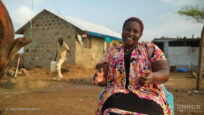
Home at last: For refugees in Kenya, moving from temporary shelter to newly built houses makes a world of difference
15 Feb 2021Kika stands outside her door and waves at her neighbours before opening the blue door that leads to her living room. At the far end is a solar-powered television set neatly surrounded by a group of plastic seats. Since her new house was completed nearly a year ago, Kika’s life […]
-
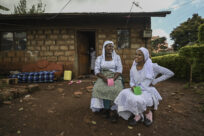
New evidence emerges from study of socioeconomic impacts of statelessness
24 Dec 2020Poverty, illiteracy, being turned away at clinics. These are difficulties 44-year-old Angeline knows all too well. She was born stateless in Kenya and for most of her life, faced day-to-day challenges associated with lacking a national identity card. “I did not go beyond class two because my parents could not […]
-
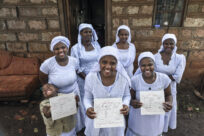
‘I want all Shona women to see that they can be anything they want’
11 Nov 2020Over 18,000 stateless people in Kenya struggle to access basic services as they lack official identity documents. A young woman has made history as the first stateless Shona woman to make it to university.
-
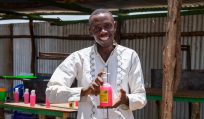
Soap maker in Kenya refugee camp lowers prices to fight COVID-19
20 May 2020When Innocent Havyarimana, a Burundian refugee, first heard handwashing was crucial in preventing coronavirus, he did something few businessmen would do – he lowered his prices. Others might have raised prices to increase profit, but his aim was to make his soap as accessible as possible, so he also boosted […]
-

Refugee students get lessons over radio during Kenya school shutdown
27 Apr 2020Teachers broadcast classes over community radio to keep refugee students learning.
-
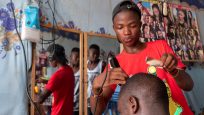
World Bank and UNHCR launch report on Understanding the Socioeconomic Conditions of Refugees in Kalobeyei, Kenya
7 Apr 2020The World Bank, in partnership with the UN Refugee Agency, UNHCR, have launched a report which is based on the results of a 2018 Kalobeyei Socioeconomic Profiling Survey. The 2018 Kaloyebei socioeconomic survey generates comparable evidence to inform policy and programme targeting to support refugees and host communities. The survey report provides […]
-
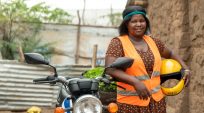
Mama Bodaboda, a motorbike rider challenging gender roles in Kakuma, Kenya
13 Mar 2020We ought to come together and work together regardless of the gender
-

Desk donations boosts inclusion and access to education for refugees
5 Mar 2020UNHCR recently provided more than 600 desks to urban schools
-
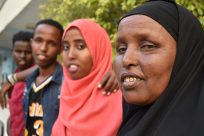
Ethiopian refugees in Kenya make an emotional return home
24 Feb 2020Dozens of refugees return home to eastern Ethiopia from Kenya’s Kakuma camp.
-
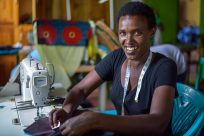
MADE51 connects refugee and host artisans in Kenya to international markets
11 Feb 2020MADE51 an innovative business model championed by UNHCR is providing refugees and host artisans global market access for their handicrafts.
